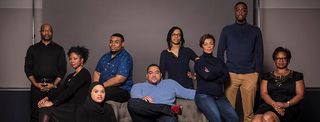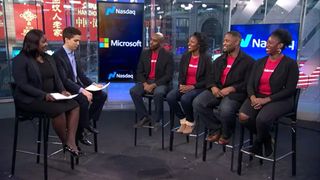Black History Month is over − this is what Microsoft did and didn't do
Black History Month is over. Did Microsoft do enough to highlight the contributions of African Americans?










Black History Month is a 28-day window designed to highlight the contributions black Americans made to the historical legacy, current progress, and future of America and the world. Its value rests on the reality that 400 hundred years of slavery, decades of racism and segregation and the enduring impact of both resulted in the ignoring, belittling and often omission of the contributions of black Americans from the historical narrative; particularly since black slaves were considered property, not citizens.
The history of black Americans is often taught within the context of the struggles endured. Consequently, their highlighted contributions to history are primarily those related to a fight for equality, thereby reducing the narrative of blacks in America to slavery and a battle for parity. This is vitally important but represents a neutered historical narrative. That's why last year I was impressed with Microsoft's "Connecting Black History to a Microsoft Future" program. It acknowledged, included and added to the "struggle" context by highlighting the values and experiences of blacks at Microsoft who are contributing to its future.
The program was forward-looking and a reflection of the centuries of innovations, leadership and more blacks, like those Microsoft spotlighted, have contributed to history that isn't part of the popular historical narrative. Sadly, after reaching out to Microsoft, I learned the program wasn't continued this year. Still, there are several efforts Microsoft participated in during Black History Month and beyond.
Blacks at Microsoft (BAM) and Nasdaq

BAM was established 30-years ago to promote Microsoft's employee and diversity initiative. BAM was recently represented on Behind the Bell by group chair Alfred Ojukwu, Vice Chairs Tekisha Thomas, and Amma Kwateng and member Michael Dunner to ring the bell on Wall Street for the second year in a row to honor Black History Month.
Kwateng explained BAM operates on three pillars:
- Connecting with other groups like National Black MBA and Black Girls Code to help build mindshare within the black community about opportunities in tech.
- Attracting diverse talent.
- Developing employee skills.
BAM is supported from the top down and collaborates with non-black allies within and outside Microsoft. Ojukwu stressed the importance of building connections, networking ideas, building awareness of what it means to be a person of color and encouraging others to make a difference. Nasdaq was so impressed with BAM that it created its own employee network, GLOBE, Global Link of Black Employees.
Microsoft and The Wall Street Project
Microsoft's Toni Townes-Whitley, President, U.S. Regulated Industries, is an African American woman who started her training in economics, transitioned to consulting, and volunteered for three years with the Peace Corps in Africa, before joining the technology field. Four years ago she became the head of Microsoft's public sector practice. She introduces Microsoft technology to federal, local and state governments, education, financial services, and healthcare industries and helps them understand how technology can change their organizations not just their IT departments.
Get the Windows Central Newsletter
All the latest news, reviews, and guides for Windows and Xbox diehards.
Whitley was invited to the 22nd Annual Rainbow PUSH Wall Street Project Economic Summit in honor of Black History Month where she participated in a Fireside Chat (above video) with project President and Founder, Jesse Jackson. The Project was founded in 1996 "to promote inclusion, opportunity and economic growth for minorities in public and private industries.
Whitley and Jackson discussed: how tech serves African American communities, technology's outpacing of governance, facial recognitions shortcoming with recognizing people of color, sex trafficking, affordable housing, the under-representation of blacks in tech and much more.
Progress was made but there's a very, very long way to go
This year Microsoft's One Small Act campaign focused on how the impact of a cousin, teacher, father and artist inspired current African American Microsoft employees to help others achieve more.
Microsoft acknowledges it has a long way to go toward fair representation of blacks within the company. Its most recent report (November 2018) on diversity revealed growth from 3.8-percent of African Americans at Microsoft to 4-percent since 2017. Blacks in tech roles crawled from 2.5- to 2.8-percent. While their representation in leadership was nudged from 2.3- to 2.4-percent. The company is engaging in various efforts to address these disparities.
The Microsoft-led Technology Education and Literacy in Schools (TEALS) program helps high schools build sustainable computer science programs. Microsoft supports Code.org which made diversity in computer science a priority and is comprised of 48-percent minority students. It supports apprenticeship programs like Apprenti and the Learning Engineering Apprenticeship Program. Microsoft also awards an annual $5000 BAM scholarship and holds an annual BAM Conference in February.
Thankfully Microsoft recognizes the systemic inequities that remain part of our culture, education system, workforce and more due to centuries of slavery and decades of overt racism, Jim Crow Laws and segregation. The explicit and legal expression of which ended less than 60-years ago. Microsoft's recognizing of Black History Month and its investments in minority communities is perhaps an acknowledgment that it understands that the enduring impacts of slavery and institutionalized racism are a big ship that will take more than six decades since the Civil Rights Movement to turn around. Ideally, Microsoft's and other's efforts during Black History month will have produced greater understanding and empathy in an increasingly divided world. Whitley said it this way:
Black History Month, a 28-day window provides an opportunity for our nation, our company [Microsoft], and each of us to pause and take stock of the condition and progress of Black people…We can celebrate the achievements and contributions of so many and, at the same time, lament the increase in violence and hate crimes, inflammatory discourse in our political arena and sense of increasing polarization across our country.
History is history, and perhaps one day it will be taught with the level of inclusivity with which it occurred.
Jason L Ward is a columnist at Windows Central. He provides unique big picture analysis of the complex world of Microsoft. Jason takes the small clues and gives you an insightful big picture perspective through storytelling that you won't find *anywhere* else. Seriously, this dude thinks outside the box. Follow him on Twitter at @JLTechWord. He's doing the "write" thing!
